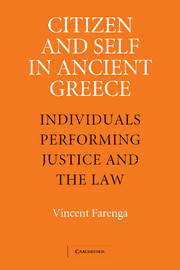Book contents
- Frontmatter
- Contents
- Acknowledgments
- Introduction
- 1 Justice to the Dead: Prototypes of the Citizen and Self in Early Greece
- 2 Performing Justice in Early Greece: Dispute Settlement in the Iliad
- 3 Self-Transformation and the Therapy of Justice in the Odyssey
- 4 Performing the Law: The Lawgiver, Statute Law, and the Jury Trial
- 5 Citizenship by Degrees: Ephebes and Demagogues in Democratic Athens, 465–460
- 6 The Naturalization of Citizen and Self in Democratic Athens, 450–411
- 7 Democracy's Narcissistic Citizens: Alcibiades and Socrates
- Conclusion
- References
- Index
3 - Self-Transformation and the Therapy of Justice in the Odyssey
Published online by Cambridge University Press: 23 July 2009
- Frontmatter
- Contents
- Acknowledgments
- Introduction
- 1 Justice to the Dead: Prototypes of the Citizen and Self in Early Greece
- 2 Performing Justice in Early Greece: Dispute Settlement in the Iliad
- 3 Self-Transformation and the Therapy of Justice in the Odyssey
- 4 Performing the Law: The Lawgiver, Statute Law, and the Jury Trial
- 5 Citizenship by Degrees: Ephebes and Demagogues in Democratic Athens, 465–460
- 6 The Naturalization of Citizen and Self in Democratic Athens, 450–411
- 7 Democracy's Narcissistic Citizens: Alcibiades and Socrates
- Conclusion
- References
- Index
Summary
HOW WERE SCRIPTS AND AGENTS OF JUSTICE TRANSFORMED?
If the basileus served in the city-state's Formative period as the arch-performer of justice thanks to his privileged cognitive and communicative skills, could an ordinary citizen ever acquire these skills as an agent of justice? In Chapter 2 we saw that the basileus, not unlike an epic poet, demonstrated several virtuoso abilities: he put the dispute at hand into different temporal and ontological frames, one of which would trump the others; he marshaled the illocutionary force of themis when performing themistes and yoked such speech genres as the oath challenge, the exemplum, and the genealogical catalogue to the appropriate thesmia in community memory; he controlled the dispute as a potential joint action by hijacking the autonomy of litigants and spectators and representing to all present the subject positions of both litigants and of the community at large; and he achieved consensus by realigning the litigants' timai in a manner that left intact his own authority as a center of redistribution for the community. In this chapter and the next, we'll consider how, as the state's central authority grew after 700, these specialized talents of the basileus yielded the performance of justice to other citizen scripts and agents.
Chapter 4 will explore how lawgivers and statute law contributed to the development of the jury trial, but in this chapter I ask what sort of self the Greeks needed to imagine as the archetypal performer of these new roles and scripts of justice.
- Type
- Chapter
- Information
- Citizen and Self in Ancient GreeceIndividuals Performing Justice and the Law, pp. 174 - 261Publisher: Cambridge University PressPrint publication year: 2006



